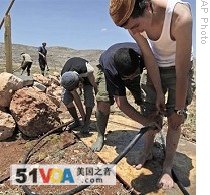Jerusalem
12 June 2009
 |
| Jewish settlers wash cement off their feet after laying foundation of new building in West Bank outpost of Maoz Esther, 28 May 2009 |
Yitzhar, a hilltop community near the West Bank city of Nablus, is home to about 500 Jewish residents.
One of them is Benjamin Allen, a Jew originally from the United States who came here nearly ten years ago. He earns his living as a construction worker and also by working part-time at a grocery store in the settlement. He and his family have established roots here, and he says leaving is not an option.
"It would destroy me. And I think that if we, God forbid, have to leave here, it's the end."
Yitzhar sits on land captured by Israel from Jordan in the 1967 Six-Day war.
Low property prices and tax incentives are some of the reasons Israeli Jews have come to live at remote, fenced-in communities like Yitzhar.
But it is ideology tied to roots in the ancient past that has driven many - including Allen - to settle here.
"We did not come back here as Israelis, we came back as Jews," said Allen. "This part of the land where I live, where we live, is where Abraham walked, and Isaac walked, and Jacob walked. This is Jewish land as far as I'm concerned."
In his speech this month, President Obama said the U.S. supports a two-state solution with the West Bank and Gaza Strip forming the Palestinian state, living peaceably alongside Israel.
But for Palestinians, settlements like Yitzhar encroach on land that has been theirs for centuries, and are an obstacle to the creation of an independent state.
In the nearby Arab village of Asira al-Qabaliya, Hiyam Suleiman and her family earn a living from growing saffron and other herbs. She says villagers have lost access to their fields. She says there will be no peace as long as the settlers are here.
She says her family's land is beyond the hill, on the other side of the settlement. She says her relatives cannot reach it because the settlers will not let them go over there.
 |
| A medic attends a Palestinian farmer after Jewish settlers from a nearby settlement in the northern West Bank allegedly attacked him as he harvested olives, 11 Oct 2008 |
Residents recorded the violence. The tape was then made public by the Israeli human rights group B'Tselem. It shows Jewish settlers moving in on Palestinian homes and hurling rocks.
Gunfire broke out. Witnesses say some of the Jews were armed. Footage shows Israeli soldiers standing by, watching.
Yitzhar, like most settlements is closely guarded due to past attacks from Palestinians who are angry over the settlers' presence.
Witnesses say the attack in September on Asira al-Qabaliya was retaliation after an Arab intruder entered Yitzhar, set a house on fire, and stabbed a Jewish child.
In the subsequent violence, at least four Palestinians were shot.
Hiyam Suleiman witnessed the attacks. She wants the settlers to leave.
She says this is no life for her and her family. She says she and her family want to be free. An Arab - she says - should be free in his own house. She says if a person is attacked, of course he will strike back because his dignity has been lost.
Hiyam's husband, Nabil Assaideh, says he hopes Palestinian leaders and the United States increase pressure on Israel to remove all Jewish settlements from the West Bank.
He says there will never be peace as long as the settlements are here. He says Israel has to remove all the settlements. Once that happens, he believes everyone will coexist. He says this land is the home of three religions: Islam, Christianity, and Judaism and he says no one should be attacking one another.
Benjamin Allen believes the existence of this and other West Bank settlements is crucial for the survival of the State of Israel. He hopes the government of Israeli Prime Minister Benjamin Netanyahu will stand firm against U.S. pressure to freeze the settlements.
"I hope when I hear what they say that they mean it and I hope that they don't cave into the pressure because I think the pressure on Israel from the EU and America is just going to increase as time goes by," said Allen.
Removing the settlements will not come easily. But without an agreement on them, analysts say peace between Israel and the Palestinians will be unlikely.